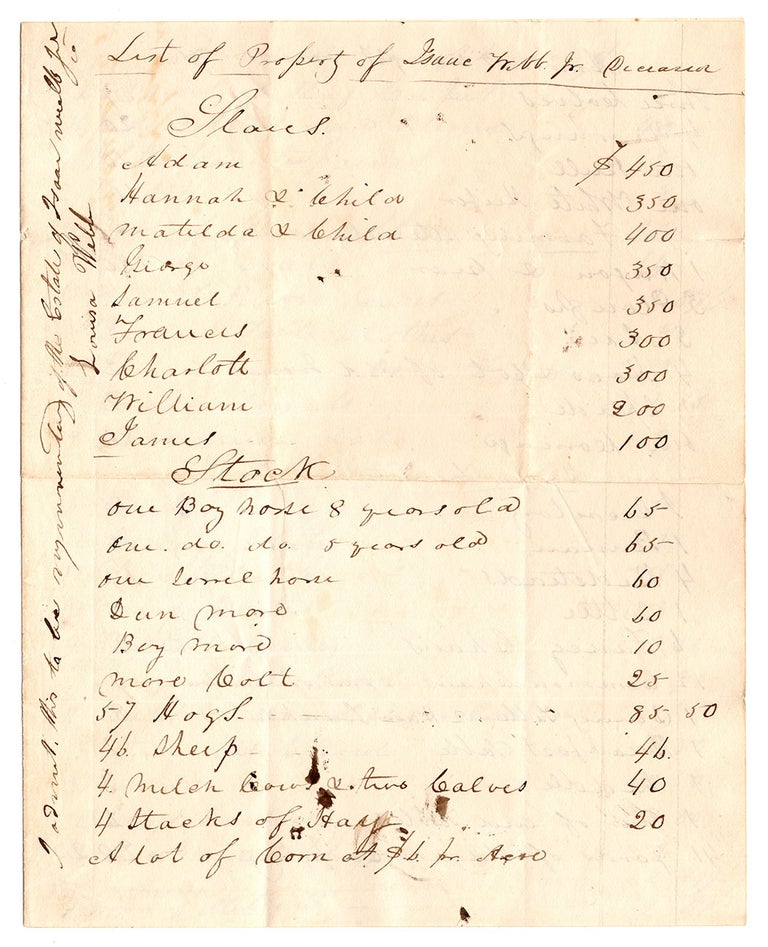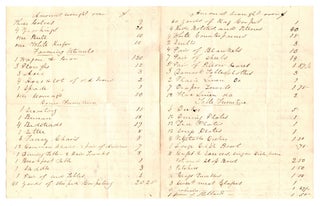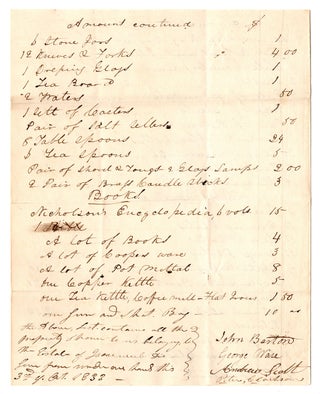List of the property of Isaac Webb Jr. Deceased.
[Lexington, Fayette County, Kentucky,] 3 October 1833. 8” x 10”. 4 pp. of manuscript. CONDITION: Very good, a few short separations along old folds. An inventory of property including nine named slaves and two unnamed child slaves of a recently-deceased Kentucky slaveholder who liberated his slaves to emigrate to Liberia on his and his wife’s deathbeds. In this document, nine named adult slaves owned by Isaac Webb Jr. are valued from $100 to $450, and two female slaves, Hannah and Matilda, are each listed as having an unnamed child. The other named slaves are George, Adam, Frances, Charlotte, William, James, and Samuel. The total value of Webb’s eleven slaves is $2,800. The inventory is divided into slaves, stock (sheep, horses, hogs, etc.), farming utensils, house furniture, table furniture, and books—slaves constituting the most valuable property recorded of all of these categories. Born in Farnham Parish, Richmond, Virginia, Capt. Isaac Webb, Jr. (1758–1833) was a veteran of the Revolutionary War, having enlisted when he was seventeen years-old. After the war, Webb received a land grant in Kentucky and around 1790 moved there with his wife Lucy Catherine Ware (1773–1833). In 1833, Webb and Lucy succumbed to the cholera epidemic (Lucy four days before Isaac), which broke out in Kentucky with great virulence. Their son Dr. James Webb, who lived in Ohio, traveled to his parents’s Kentucky home to manumit the slaves he inherited. While taking care of those who were sick—several of whom are known to have died—James caught the disease himself and died on 1 July 1833. The eleven slaves documented here were those that survived the epidemic. A codicil dated 22 June 1833 to Webb’s last will and testament liberated his slaves, “from fifteen to twenty” (either the age-range or number of slaves), on the condition of their removal to Liberia. The fund already accumulated under the testator's direction was $800. The codicil reads: Through the infinite mercy of a covenant [of] God, being preserved, amidst great bodily suffering, in a sound state of mind, in a good hope through grace; I have requested this brief memorandum to be drawn up, expressing my present wish, and that of my dear Companion, who is probably also on her death bed, respecting the disposition of my servants, viz: That they shall all be hired out by Trustees to be named, for the term of three, four, of five years, at the discretion of the Trustees, until a fund is thereby raised sufficient to defray the expense of their removal to Liberia, and comfortable settlement there; and if any refuse to be removed, they must continue in bondage. Many slaveholders who had traveled from Virginia to Kentucky with their slaves eventually decided to embrace the notion of freedom for all men. This about-turn has been explained by the influence of three factors: Kentucky’s abolition movement which sprang up as early as the 1790s; the religious revival that swept through the area during the early-19th century and worked to open the minds of some of the new Kentuckians; and the small-farm structure of Kentucky in which slave labor was not as critical to profits as it was for the labor-intensive crops of the Deep South. Webb is said to have become convinced of the evil of the institution, leading him to free his slaves. However, he was less benevolent than some other Kentuckians, making that freedom contingent on emigration to Liberia. REFERENCES: Allen, Jeffrey B. “‘All of Us Are Highly Pleased with the Country’: Black and White Kentuckians on Liberian Colonization.” Phylon, Vol. 43, No. 2 (Clark Atlanta University: 2nd Qtr., 1982), pp. 97–109; The American Colonization Society. The African Repository and Colonial Journal, Vol. 12 (Washington D.C.: James C. Dunn, 1836); “Dr. James Webb (1795–1883)” (2009) at Ware Families online; “Chapter 3: The Call of Kentucky” at Ware Genealogy online.
Item #7390
Sold




